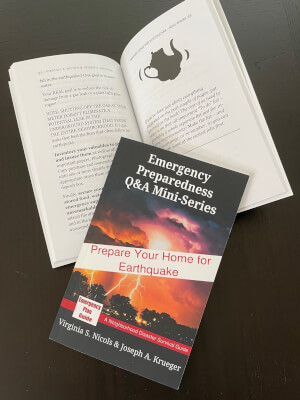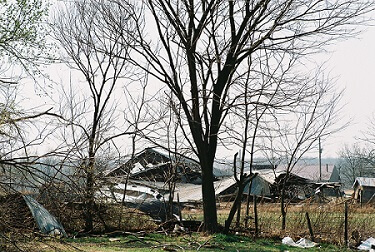Prepare Your Home for Earthquake – Second Edition!

We like Q & A! The fifth question in this new edition is: “Will I get any warning before an earthquake?” How do YOU answer?
Virginia’s earthquake backstory . . .
Years ago the condo building I moved into in the Bay Area was balanced right over the now-famous San Andreas fault. It was at the second meeting of the board of the homeowners’ association that I became aware of that fact! My interest in earthquakes began that day!
As it turned out, on the day the Loma Prieta quake hit California in 1989, its epicenter was about 50 miles away from our building. The building came through. But we all felt that quake. We felt aftershocks. We slept outside that night for fear of more to come. And of course, then we had to clean up.
My understanding of preparing for earthquakes began that day!
Fast forward to today . . .
In 2000 Joe and I moved to Southern California. Again, we find ourselves within shaking distance of the San Andreas. But through our CERT training and our neighborhood preparedness group we have expanded our knowledge about earthquakes and earthquake preparedness. In 2020 we added another book — Prepare Your Home for Earthquake — to the Q & A mini-series we were working on.
This year, only 3 years later, we have had to add a couple of new questions, and update and revise every one of those earlier answers!
There’s just too much happening not only around the globe but right here on the west coast. Plus new neighbors just keep asking these same questions — and new ones.
“What will I get with this 2023 Second Edition?”
As always, we expect you live a really busy life. So, this mini-book . . .
- Has only 62 pages, and a largish font. It’s an easy read.
- Is built around a dozen or so common questions so you can pick the ones you are interested in.
- Offers straight-forward answers that you can apply or not depending on your living situation and your budget.
- Refers you to detailed resources if you want more info.
- Encourages you to add chosen “to-do” items to your personal emergency planning. As we’ve said before, we see emergency preparedness as a lifestyle, not a project!
Finally, we try to keep all our mini-books as easy to get and as inexpensive as possible by distributing them through Amazon. We want people to buy multiples as gifts and share with family, friends and neighbors!
The links below take you directly to the mini-book. Price right now is $5.99 for paperback, $3.99 for ebook.

Paperback version – Recommended. Use a highlighter and/or take notes right on the page.
Ebook version – Tap in for another question when you have a few minutes to spare. Convenient. Efficient.
In case you’re wondering about the questions, here they are. How would you answer if asked about preparing your home?
- Do I really face earthquake danger?
- Aren’t there other ways of reacting to an earthquake besides DROP, COVER and HOLD ON?
- What should I assume will happen after the earthquake?
- Will I get any warning beforehand?
- How do I know if I’m actually in an earthquake zone?
- OK, I’m in an earthquake zone. What changes should I be making inside my house?
- What about strengthening the basic structure of the home?
- How does earthquake insurance work and how expensive is it?
- Why was the 1906 San Francisco earthquake so destructive, and what have we learned from it?
- What role can a Community Emergency Response Team (CERT) play in preparing for earthquake?
This mini-book won’t have every answer to every question about earthquakes. But after you’ve read it, you’ll know more about the risks. If you take some of the recommended actions, you’ll be better able to handle them!
The upcoming earthquake may catch you off guard. But don’t let it catch you unprepared!
Virginia
Your Emergency Plan Guide team
P.S. If you want to take a look at the whole collection of mini-books, you can read more here on our site, or you can go directly to the “series” page at Amazon.

